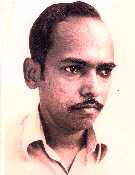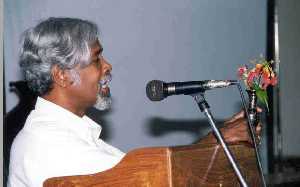
Home | Biodata | Biography | Photo Gallery | Publications | Tributes
Mourning the loss

 |
Home | Biodata | Biography | Photo Gallery | Publications | Tributes Mourning the loss |
 |
There is sadness in our hearts for we have lost a dear friend, but it is with gladness that we see that a soul so pure and a heart so kind and gentle ever walked on this campus. And it is with pride that we recall that we were fortunate to work and walk with this great and powerful mind. Fifty years from now, and 150 years from now, Dr. Siromoney will still be remembered as one among the greatest men of this college. For it is men of his calibre and quality who make this college and keep it going. Perhaps, Dr. Siromoney was just waiting for the 150th year to end before he wanted to bid farewell. I still recall how I took Dr. Siromoney to the Michigan Computing Center in the 70s, and how with wonder and awe I saw this man from Selaiyur Reserved Forests make such intelligent conversation with the director, Burkes, a pioneer and founder of computer languages! Dr. Siromoney would make a sincere and serious conversation with a child or with simple persons on the street; he could also make a brilliant discourse on the statistical probabilities of the existence of tachyons. People have often asked, "Is Dr.Siromoney really so brilliant as people say?" No, Dr.Siromoney was not just brilliant, he was a genius. His was a mind that among only about half a dozen other men in the world, would take up the challenge of breaking the Indus Valley script. Perhaps he wanted to leave this glory of decipherment of the code to one of his colleagues or students in this College.
Why do I mourn this man as I have not mourned any other? We all are attracted to other people for at least two reasons. One, we share a common interest with each other. Two, we see in others, qualities that are lacking in ourselves and that we wish to possess. I shared with Dr.Siromoney the love of enquiry and the intellectual joy of understanding the world around us. I also saw in this man a certain godliness and purity that I have seldom seen among others.
More than 20 years ago he took me along with Dr. Lockwood, to Mamallapuram, telling me that he would like me to identify a tree in the Great Penance Panel. I
tried, but he already knew the answer. He always knew, and he was always one step ahead of you. But
this was his way of getting me initiated into his world of enquiry  just as he had done it before and had done since then to many others. For any one who cared, Dr.Siromoney was ready to reveal one's place on this earth
just as he had done it before and had done since then to many others. For any one who cared, Dr.Siromoney was ready to reveal one's place on this earth
 through the stars galaxies in the sky, through the 150 million-year old fossils that he picked or helped you pick near
Sriperumbudur, through the 25000 year old paleoliths he gathered from this region, through the pottery shreds, the Iron Age sites, the inscriptions and the monuments. With Dr.Siromoney one could perceive an order in this seemingly complex world of material, men, plants, birds and butterflies. As for me, I will always see him in every butterfly.
through the stars galaxies in the sky, through the 150 million-year old fossils that he picked or helped you pick near
Sriperumbudur, through the 25000 year old paleoliths he gathered from this region, through the pottery shreds, the Iron Age sites, the inscriptions and the monuments. With Dr.Siromoney one could perceive an order in this seemingly complex world of material, men, plants, birds and butterflies. As for me, I will always see him in every butterfly.
How excited he was to learn that his old
observation, and that of his teacher Dr.Kibble, of the Common Crow butterfly scratching the pods of a crotalaria plant was now shown to be in order for the butterflies to obtain an alkaloid for chemical communication in mating? How I remember his determined struggle to be recognized as an equal when he first entered the circle of scholars in the
Archaeological Society of South India? As a beginner and a loner he would delve into new frontiers
 archaeology, epigraphy, computers etc
archaeology, epigraphy, computers etc  soon to be recognized as an equal by all in each field. He would present his findings not only in
the international foray, but also, and with equal interest, write them up in the Madras Christian College Magazine. The magazine and the college were always dear to him. There lies in the college magazine a short article of his, coauthored with Dr. Lockwood on the origin of the Brahmi script, which like many of his other contributions, is awaiting its time for the better recognition of his genius.
Following his last journey to the cemetery I could recall, how some four years ago, just on this road, sitting on the back of his motorcycle, we had a narrow escape when large barrels tumbled down from the lorry ahead of us, and how with great agility and ease Dr. Siromoney managed to swerve to the left and keep going to attend a lecture by Dr. Iravatham
Mahadevan. Later that evening, at the cemetery, amidst so much sadness, I could not but help notice something I had never seen
soon to be recognized as an equal by all in each field. He would present his findings not only in
the international foray, but also, and with equal interest, write them up in the Madras Christian College Magazine. The magazine and the college were always dear to him. There lies in the college magazine a short article of his, coauthored with Dr. Lockwood on the origin of the Brahmi script, which like many of his other contributions, is awaiting its time for the better recognition of his genius.
Following his last journey to the cemetery I could recall, how some four years ago, just on this road, sitting on the back of his motorcycle, we had a narrow escape when large barrels tumbled down from the lorry ahead of us, and how with great agility and ease Dr. Siromoney managed to swerve to the left and keep going to attend a lecture by Dr. Iravatham
Mahadevan. Later that evening, at the cemetery, amidst so much sadness, I could not but help notice something I had never seen
 a tiny leaf-like object moving about on the clay dug up to bury him. He would have certainly approved of my paying attention to such things at such time. For Dr. Siromoney would always do anything that would help take the burden off the minds of his friends, even for a moment.
a tiny leaf-like object moving about on the clay dug up to bury him. He would have certainly approved of my paying attention to such things at such time. For Dr. Siromoney would always do anything that would help take the burden off the minds of his friends, even for a moment.
When a certain responsibility was assigned to me I went to Dr. Siromoney's house for advice; should I or should I not take up this responsibility. We talked for nearly three hours, over a cup of coffee. I have never known
him refuse a cup of coffee; this was his way of showing he had all the time in the world for
friends. I wanted him to say, "Take it up" or "No, concentrate on your research and teaching." But all that he would say was, "I hope now you can see things a little better so you can make a better judgement"! This was his style, of knowing exactly what he would do, but never imposing his decision on you. You had to do it. And whatever you decided to do, you could be sure that he was there wishing all the best for you.
Dr. Siromoney touched the lives of so many people  colleagues, children, students, missionaries, Narikoravas, and the people in that forlorn village of Ammanambakkam. Somehow, his short life seemed to have spanned
many generations. He was your friend, he was also a friend of those who left the college 5 years ago, 10 years ago, even 20 years ago, of the Shaws, of the Kibbles, and of Boyd.
colleagues, children, students, missionaries, Narikoravas, and the people in that forlorn village of Ammanambakkam. Somehow, his short life seemed to have spanned
many generations. He was your friend, he was also a friend of those who left the college 5 years ago, 10 years ago, even 20 years ago, of the Shaws, of the Kibbles, and of Boyd.
Dr. Siromoney was a simple man  simple to the core. He could with ease converse with the most sophisticated in the world, but his heart was with the simple and the poor and the Narikoravas. May be this is why he chose to breathe his last in the General Hospital, like a common man, seeking no special attention, like that woman who was waiting in front of the operation theatre for
hours and walked off sadly saying, "They cannot do the surgery for me today because they say there is no blood available for
me".
simple to the core. He could with ease converse with the most sophisticated in the world, but his heart was with the simple and the poor and the Narikoravas. May be this is why he chose to breathe his last in the General Hospital, like a common man, seeking no special attention, like that woman who was waiting in front of the operation theatre for
hours and walked off sadly saying, "They cannot do the surgery for me today because they say there is no blood available for
me".
Did not the Buddha ask for mustard from a house where no one has died to revive a child who was bitten and killed by a snake? Did I not pray to God when as a young boy, I heard that my gentle and tender younger brother had died in a hospital? Did we not pray to God as one heart to save Dr.Siromoney? What then is this mystery? That a soul such as this should be snatched away from us so early? I could discuss such questions as this so easily with one man. But then he is gone now. No, I am not sure, even he may not have answered you.
We should ever be thankful that it was our
fortune that this rare gift of God was ours for a while. May his soul rest in
peace.
Dayanandan P. (Student in Botany, Colleague and Friend: 1964-88)
Currently: Head, Department of Botany, Madras Christian College.